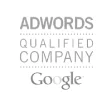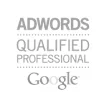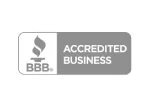In the current competitive legal landscape, acquiring proficiency in both Search Engine Optimization (SEO) and Pay-Per-Click (PPC) advertising is crucial for enhancing your law firm’s digital visibility. This powerful duo can significantly amplify your online presence, drawing in a more targeted audience while also building a strong, sustainable brand.
SEO works to establish your firm's visibility organically over time and boost your rank on search engine results pages, ensuring you're seen as a credible authority. On the other hand, PPC advertising provides the flexibility to immediately appear in search results, positioning your firm directly in front of potential clients who are actively looking for legal services. Together, they not only increase your digital footprint but ensure that your firm is consistently at the forefront of relevant searches.
Understanding SEO and PPC Basics

Search Engine Optimization (SEO)
Search Engine Optimization (SEO), also known as search engine marketing, strategically improves your law firm's website ranking on search engines, thereby greatly increasing its online visibility. This process drives organic website traffic, improves user engagement, and increases your site's authority and trust. Effective SEO leads to higher conversion rates by attracting a more targeted audience, which is essential for maximizing your digital marketing return on investment.
Pay-Per-Click PPC
Pay-per-click (PPC), also known as paid search engine marketing, is a model in which advertisers incur a cost each time their advertisement is clicked. This powerful method allows for precise targeting and immediate visibility in search engine results, driving traffic directly to your website. PPC is highly effective for achieving quick results, increasing brand awareness, and maximizing return on investment by reaching potential clients at the critical moment they are ready to engage.
Long-Term vs. Immediate Needs
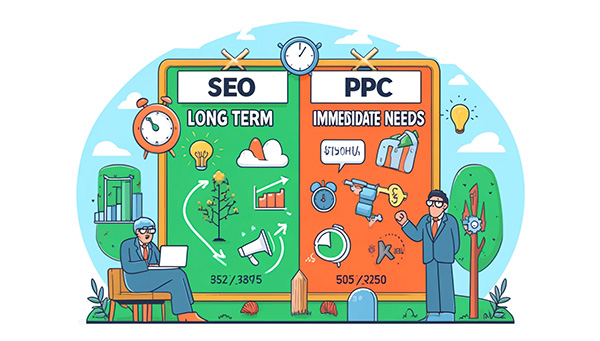
SEO for Long-Term Sustainability
SEO should be regarded as a long-term investment for a law firm. It focuses on building a strong foundation through high-quality content, robust backlinks, and optimized website performance that yields sustainable organic traffic over time. The benefits of a well-executed SEO strategy include improved site authority, higher trust levels with potential clients, and reduced acquisition costs. However, SEO results typically take time to become apparent, necessitating patience and persistence.
PPC for Immediate Impact
On the other hand, PPC offers immediacy. It allows law firms to appear at the top of search engine results quickly, which is crucial for capturing high-intent clients in need of legal services right away. PPC can be particularly useful for targeting specific case types, promoting new services, or pushing into new geographical markets. The ability to control budget, target precisely, and adjust campaigns in real-time provides the agility necessary to respond to immediate market and competitive pressures.
Integrating Both for Maximum Effectiveness
For law firms, integrating SEO and PPC allows for covering all bases—addressing both the slow-building credibility and authority needed to rank organically and the ability to generate immediate leads and conversions through targeted ads. This synergy improves overall search visibility and enhances each channel's effectiveness through shared keyword and conversion data.
Ultimately, understanding when to leverage the quick wins of PPC and when to invest in the long-term benefits of SEO can define a law firm’s ability to thrive in a competitive market. By strategically balancing these approaches, firms can ensure they meet their immediate client acquisition needs while also building a foundation for future growth.
Strategic Integration for Enhanced Results
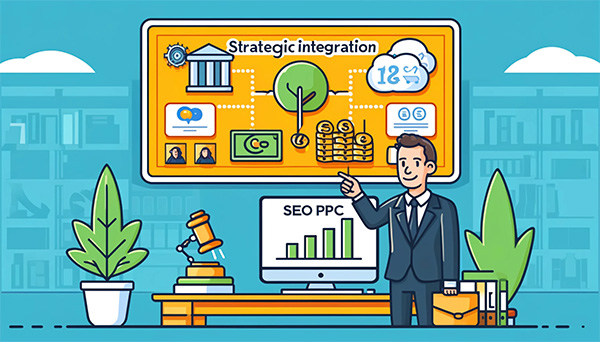
Strategically integrating SEO and PPC for law firms unlocks a comprehensive approach to digital marketing that enhances results across the board. By synchronizing SEO's long-term organic growth with PPC's immediate impact, law firms can effectively dominate both areas of the search engine results page, creating a robust online presence that's hard to overlook.
SEO efforts create a lasting foundation by optimizing website content to achieve higher rankings in organic search results. This builds credibility and attracts a consistent flow of traffic over time. This method is particularly valuable for law firms as it nurtures trust and authority in a highly competitive industry.
On the other hand, PPC offers the agility to adapt to market demands quickly, target specific client demographics, and drive immediate traffic during high-stakes campaigns or promotions. It's especially beneficial for attracting potential clients' attention when they're searching for legal services.
Insights from PPC campaign data can inform SEO strategies, helping to pinpoint the most effective keywords and trends that drive engagement and conversions. This strategic integration ensures that every marketing dollar spent is optimized for maximum impact, delivering enhanced visibility, increased traffic, and higher conversion rates, which are crucial for the growth and success of any law firm.
Tactical Applications

For law firms looking to maximize their digital marketing strategy, the tactical application of SEO and PPC together can lead to significant gains. Here's a deeper dive into how these strategies can be integrated more effectively:
Advanced Keyword Optimization
Start by conducting keyword research and identifying which relevant keywords generate the most qualified traffic and lead conversions. Incorporate these keywords into your website's SEO strategy by enhancing content, meta tags, and headers, thereby ensuring that your organic and paid efforts are mutually reinforcing. This can also help uncover niche keywords with lower competition and higher conversion potentials, which can be gold mines for attracting specific client types.
Content Optimization and Utilization
Create authoritative, SEO-friendly content that addresses common legal issues or questions. This content can then be directly linked to PPC ads, ensuring that potential clients who click through find exactly what they’re looking for. This strategy improves user experience and increases the likelihood of conversion. Furthermore, regularly updating old content with new insights or legal precedents can refresh your pages and improve organic search rankings while keeping your PPC landing pages relevant and effective.
Enhanced Geo-Targeting Techniques
Beyond basic location targeting, use advanced geo-targeting options in PPC campaigns to adjust bids based on specific regions with higher engagement or conversion rates. This data can also inform local SEO efforts by identifying which areas to focus on in your content creation, such as tailoring blog posts or articles to address region-specific legal issues or regulations.
Adapting to Market Dynamics with Agile PPC Campaigns
Law firms can use PPC to respond quickly to market changes or legal trends. For example, if a new regulation or high-profile case affects your practice area, quickly set up PPC campaigns to target searches related to these topics. Simultaneously, develop comprehensive SEO content that provides deeper insights or guidance on these issues, establishing your firm as a thought leader.
Reputation Management Through Strategic Ad Placements
In the event of negative publicity or a crisis, PPC can be an immediate tool to manage your firm’s public image. Create ads that link to content showcasing your firm’s commitment to ethics, community involvement, or positive client testimonials. SEO efforts should be geared towards optimizing positive content and suppressing negative search results over time by promoting favorable stories or reviews.
Cross-Channel Data Utilization
Harness the analytics from both SEO and PPC to get a complete picture of your audience’s behavior and preferences. Analyzing data from both channels can reveal key user intent and conversion paths, which can then be optimized to funnel potential clients more effectively through your marketing campaigns.
By expanding on these tactics, law firms can increase their visibility and client acquisition and build a more resilient online presence that can adapt to both short-term fluctuations and long-term shifts in the legal landscape. This strategic integration ensures that every aspect of online marketing works together to support both immediate needs and the firm's broader goals.
Combating Negative Publicity
In the legal service industry, negative publicity can quickly escalate, affecting a law firm's reputation and client trust. Combining SEO and PPC offers a proactive and dynamic strategy to manage and mitigate such challenges effectively. Here’s how these tools can work together to protect and enhance your firm's reputation:
SEO for Long-Term Reputation Management
Optimize your website’s content to promote positive stories, achievements, and client testimonials. Enhance your blog with articles highlighting your firm’s community involvement, legal successes, and expert commentary. This SEO-driven content pushes down negative search results over time, organically improving your firm's online reputation.
PPC for Immediate Response
In the face of negative press, PPC allows for immediate control over the narrative. Create targeted ad campaigns that direct searchers to specially crafted landing pages with messages that address any negative issues directly or showcase your firm's commitment to client success and ethical practices. This approach helps to quickly counteract the impact of unfavorable news, ensuring that potential clients see your firm in a positive light first.
Synergistic Strategy
Use insights from PPC campaigns to understand public concerns and questions about your firm, then address these topics in your SEO content. This dual approach counters current negative impressions and strengthens your proactive defenses against future incidents.
By strategically utilizing SEO and PPC, law firms can not only quickly address negative publicity but also build a stronger, more resilient brand that stands up to scrutiny and maintains client trust over time.
Evaluating Effectiveness

Evaluating the effectiveness of combining SEO and PPC for a law firm involves a strategic approach to data analysis and performance metrics that allows you to measure success and make informed decisions.
Key Performance Indicators (KPIs): Begin by establishing distinct KPIs for both SEO and PPC. For SEO, monitor metrics such as organic traffic, keyword rankings, and conversion rates stemming from organic searches. For PPC, track metrics like click-through rates (CTR), cost per click (CPC), and conversion rates originating from paid ads. These metrics will help you understand the direct impact of each strategy on your firm's website traffic and client acquisition.
Integration of Analytics Tools: Utilize tools like Google Analytics and Google Ads to gather data from both SEO and PPC campaigns. This integrated analysis helps identify which channels drive the most valuable traffic and which keywords most effectively convert prospects into clients. Tracking the user journey from initial click to conversion is crucial in understanding how these digital marketing strategies complement each other.
Attribution Modeling: Integrate attribution models that assist in assigning credit to different touchpoints within the conversion path. This is crucial in understanding how SEO and PPC contribute to final conversions. A multi-touch attribution model might be most effective for law firms, acknowledging that initial (often PPC) and sustained (typically SEO) interactions play roles in converting prospects into clients.
ROI Analysis: Calculate the return on investment for SEO and PPC by comparing the cost of these campaigns to the revenue generated from new clients acquired through each channel. This approach will help you assess the cost-effectiveness of each strategy and adjust your expenditure accordingly.
A/B Testing: Continuously experiment with various elements of your PPC ads and SEO strategies to identify what resonates best with your target audience. For PPC, experiment with various ad formats, landing pages, and messaging. For SEO, test different content formats and keyword strategies. Utilize the findings to continually refine your approach.
Feedback Loop: Establish a feedback loop where insights gleaned from PPC ad performance inform your SEO strategy, and reciprocally, insights from SEO tactics inform your PPC approach. For example, high-performing PPC keywords should be considered for SEO content creation, and user engagement insights from SEO can help optimize PPC landing pages.
Regular Reviews and Adjustments: Plan regular assessments of campaign performance to enable real-time adjustments to strategies. Analyzing trends over time, like seasonal variations in search behavior or changes in the competitive landscape, can help fine-tune campaigns for better ROI.
By regularly evaluating these elements, law firms can improve their marketing strategies and ensure they are investing wisely, maximizing their digital marketing ROI, and effectively reaching potential clients.


